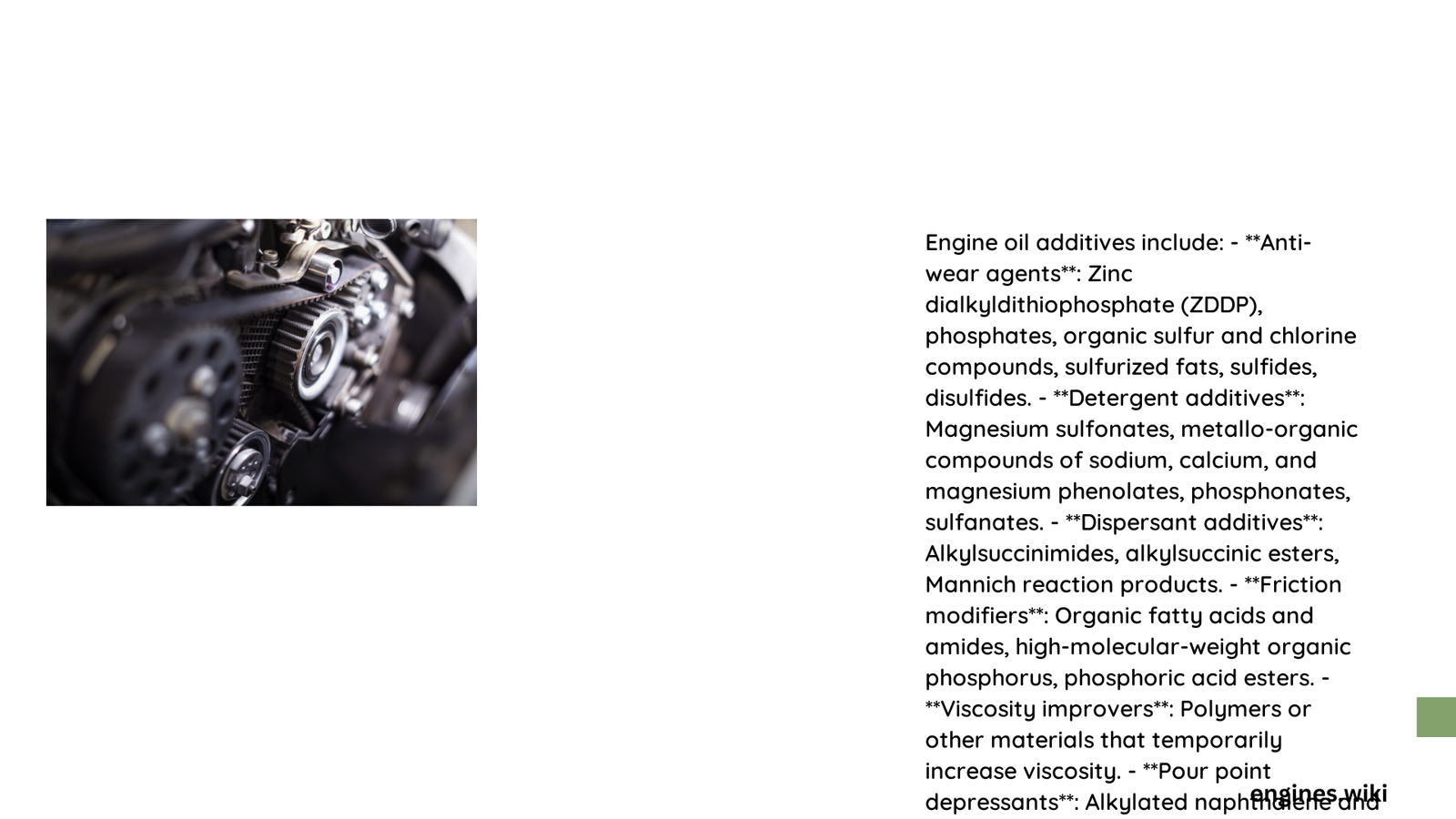Engine oil additives are specialized chemical compounds designed to enhance lubricant performance, protect engine components, and optimize mechanical efficiency. These sophisticated molecular formulations improve viscosity, reduce wear, prevent corrosion, and maintain engine cleanliness across diverse operating conditions, transforming standard motor oils into high-performance protective solutions for modern automotive powertrains.
What Are Engine Oil Additives?
Engine oil additives represent complex chemical compounds strategically integrated into base lubricant formulations to enhance performance, protection, and longevity of automotive engines. These specialized molecules interact with engine surfaces and lubricant properties to deliver multiple critical functions.
Why Do Engines Need Oil Additives?
| Additive Type | Primary Function | Performance Impact |
|---|---|---|
| Viscosity Improvers | Stabilize Oil Viscosity | Maintain consistent lubrication across temperature ranges |
| Anti-Wear Agents | Reduce Metal-to-Metal Contact | Minimize component wear and extend engine life |
| Detergents | Clean Internal Engine Surfaces | Prevent sludge and deposit accumulation |
Comprehensive Engine Oil Additives Classification

Chemical Composition of Key Additives
- Viscosity Index Improvers
- Polymer-based compounds
- Typically polyacrylates and polyalkylmethacrylates
- Concentration: 1-5% of total oil volume
-
Enhance oil performance across temperature spectrum
-
Anti-Wear Additives
- Primary compounds: Zinc dialkyl dithiophosphate (ZDDP)
- Molecular structures prevent metal surface degradation
- Recommended usage: 1-3% of total oil volume
- Critical for protecting high-stress engine components
Performance Enhancement Mechanisms
Friction Modification Strategies
- Molecular Interaction: Additives create microscopic protective layers
- Wear Reduction: Minimize metal-to-metal contact
- Efficiency Improvement: Potential fuel economy gains of 2-5%
Advanced Additive Technologies
Emerging Trends in Oil Additive Development
- Nanotechnology-enhanced additives
- Environmentally sustainable chemical formulations
- Improved thermal stability compounds
- Enhanced synthetic polymer technologies
Selection Criteria for Engine Oil Additives
Factors Influencing Additive Performance
- Engine Type
- Operating Temperature Range
- Vehicle Mileage
- Manufacturer Specifications
- Driving Conditions
Recommended Additive Concentrations
| Additive Category | Typical Concentration Range |
|---|---|
| Detergents | 5-10% |
| Dispersants | 5-10% |
| Anti-Wear Agents | 1-3% |
| Friction Modifiers | 1-2% |
Expert Recommendations
Best Practices for Oil Additive Selection
- Consult vehicle manufacturer guidelines
- Consider specific driving environment
- Match additives to engine design
- Prioritize comprehensive protection packages
- Regular oil analysis and monitoring
Technical Insights
Molecular Engineering of Additives
Advanced additives leverage sophisticated chemical engineering to:
– Create protective molecular barriers
– Modify surface interactions
– Enhance thermal stability
– Reduce mechanical friction
Performance Metrics
Quantifiable Benefits of Quality Additives
- Wear reduction: Up to 50%
- Oxidation prevention: 90% reduction
- Fuel efficiency improvement: 2-5%
- Extended engine component lifespan
Cost-Performance Analysis
Investment in Quality Additives
- Higher initial cost
- Long-term engine protection
- Reduced maintenance expenses
- Enhanced vehicle performance
Conclusion
Engine oil additives represent a critical technological intervention in automotive lubrication, transforming standard oils into sophisticated performance-enhancing solutions.
